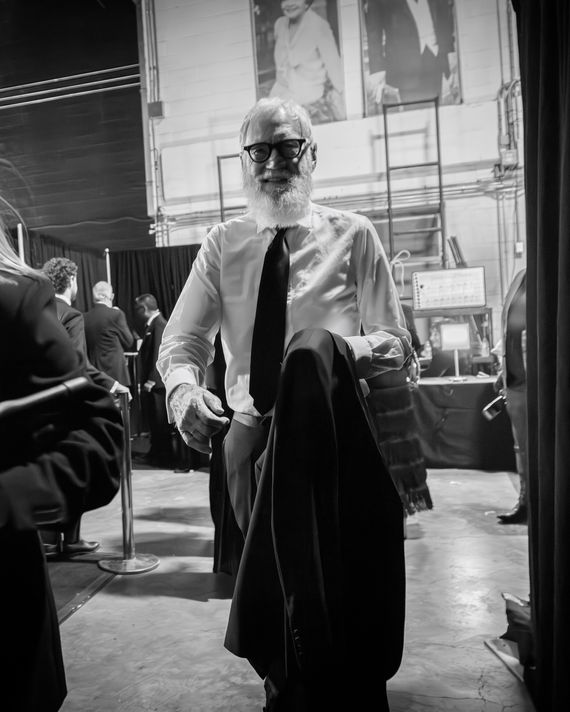
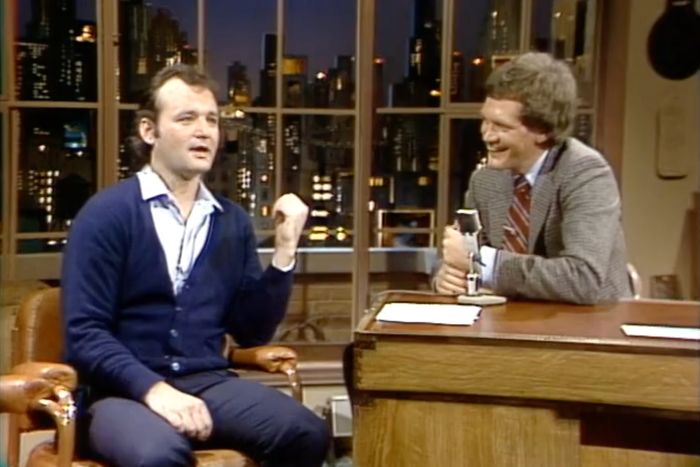
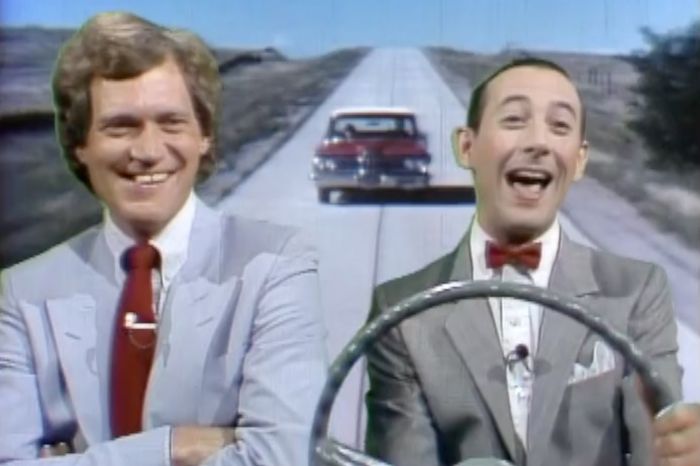
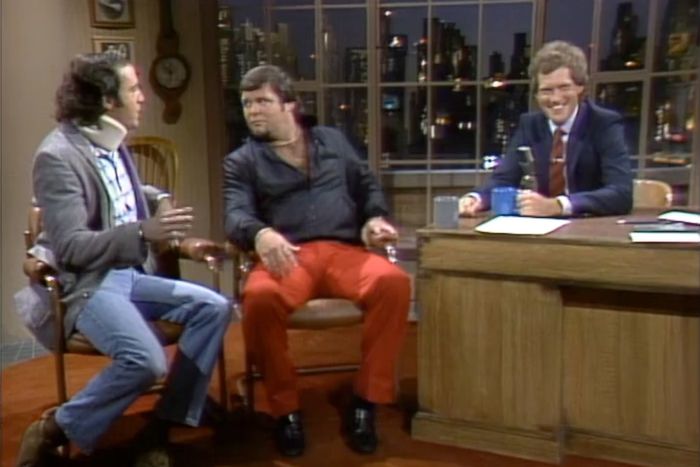

“This format will always exist, just perhaps not on network television.” Photo: Michele Crowe/CBS via Getty Images
It’s been ten years since David Letterman stepped away from the grind of hosting a late-night talk show, but time has not dulled his legendarily dry wit, even though at least one member of his family wishes it had. “For some reason, my wife — we’ve been married for 72 years — has decided that she’s my public defender,” the comedy icon tells me, his voice as affably grumpy as ever. “So whenever we go anyplace and I say, ‘Oh, what is this, a parakeet?’ when we’re clearly in Whole Foods, she will say, ‘Oh, he’s kidding. No, no, it’s a joke. He’s kidding.’ And that happens all the time now.”
Letterman pretends his wife’s commentary is annoying, but really, this anecdote is just another way to poke fun at himself: The subtext of her Dave-splaining is that his celebrity has faded to the point that strangers need to be assured they haven’t stumbled upon a very confused 78-year-old man. “I used to hope that the audience, whether it’s one or 1,000, would recognize that something was a joke,” Letterman says. “But the index of those who know who I am? Getting smaller every day. So in a way, I guess she’s doing me a favor because I could easily be zip-tied and hauled out of these places.”
And yet, while Letterman may not be at the center of the cultural Zeitgeist the way he was ten or 15 years ago, he has hardly disappeared into the background. His Netflix interview show, My Next Guest Needs No Introduction, has snagged multiple Emmy nominations (and one win) since launching in 2018 and, earlier this summer, netted a two-season renewal from the streamer. Rather than jumping on the celebrity-podcast bandwagon, Letterman has instead offered fans regular updates (and flexed his comedic muscles) as a permanent guest on The Barbara Gaines Show, a YouTube series fronted by the former Late Night executive producer (and often co-hosted by My Next Guest producer Mary Barclay). The show is hosted on Letterman’s own robust YouTube channel, which is updated regularly with new (and often timely) clips from the Letterman library, including musical performances. And in December, Letterman partnered with Samsung to launch a free, ad-supported (a.k.a. FAST) TV channel dubbed Letterman TV. Available via the electronics giant’s Samsung TV Plus platform, the virtual channel offers a curated collection of Letterman sketches and interviews along with newly taped intros and commentary from the host himself.
Until now, Letterman TV has relied exclusively on 22 years’ worth of output from the comedian’s CBS Late Show, which was produced and owned by his Worldwide Pants production company. But as part of a new agreement with NBCUniversal being unveiled today, the channel will also begin streaming content from Letterman’s NBC Late Night era, adding material from more than 1,800 episodes to the mix. Content will be regularly refreshed, but the initial batch of programming set to go live on September 10 includes packages of appearances by Pee-wee Herman, Andy Kaufman, and Steve Martin, plus a handful of full-length episodes such as the series premiere (with guest Bill Murray), the one-year anniversary special, and themed episodes like “Camping With Barry White.”
Unlike many talent-specific FAST channels that can be viewed across a variety of platforms (Pluto TV, the Roku Channel, etc.), Letterman TV — along with a similar Conan O’Brien channel that debuted in 2023 — is exclusive to Samsung devices. Because of that, Samsung TV Plus content chief Takashi Nakano says the platform is dedicating “more firepower” to get the channel in front of its global audience of nearly 90 million monthly active users. “We do promote it heavily because of this,” he says. “We have access to Times Square, we have access to other large screens that we can do massive promotions around, and our marketing team has got a robust plan to make this come to life across our platforms. We are going to put a lot of muscle behind it. And so is Dave, by the way.”
Indeed he is: In conjunction with the arrival of the new Late Night library on his FAST channel, Letterman last week hopped on the phone with Vulture for a 40-minute conversation on an array of topics. He talked about his NBC years, of course, including the incredibly short-lived daytime talk show that paved the way for Late Night, and why so many of his best-known bits would work today in the age of viral social-media moments. Letterman also had thoughts about the chumminess among today’s late-night hosts, his love for John Mulaney, his complicated relationship with Jay Leno, the future of late night, and, yes, CBS’s decision to cancel not only Stephen Colbert but the entire franchise Letterman created more than 32 years ago.
Hello, David, and first of all, thank you for your time. How are you?
Well, Joe, I was thinking about this: You and I have known each other forever at this point.
I mean, I’ve known you forever, certainly, and I’ve been covering you since I started working as a reporter in (redacted). So yes, it’s been quite a while.
Yeah, well, it’s nice to have a relationship this long with somebody who kind of has witnessed all of this mess. Thank you.
I’m no Bill Carter, but I try. And my hair is getting whiter, so …
Bill Carter? (Laughs.) Oh, my goodness. Bill Carter, the man who’s made a career out of late-night TV. He really has. God bless him. He’s soliciting money. He’s starting a late-night theme park.
See, that’s one good reason to do your Netflix show and put your library on free streaming services: to make sure the kids today know who you are and what late-night TV is all about.
Oh, God bless the kids today.
Letterman with Bill Murray on NBC’s Late Night. Photo: NBC
Speaking of which, we’re doing this interview partly because of the return of your original NBC series, Late Night, to TV via Samsung TV Plus and its Letterman TV channel. I want to go back to the launch of that show and try to get into your head about what was going on then. A couple of years earlier, NBC had given you a daytime talk show, and it was canceled after just a few months because of lousy ratings. How did that whole experience impact you and the process of creating Late Night?
I appreciate this, because it sparks memories. Looking at it now, with age, that was a fascinating life experience. I left Indiana thinking, Everything that’s wrong with television and television comedy, I have the solution. And as soon as I get out there, just hang on. If you folks can wait it out another year or two, I will solve everything that’s wrong with comedy on television.
Now, I will say that was before Saturday Night Live, so they helped my load be a little lighter in the lift, in my mind. And we dropped down at, I think, ten in the morning, or nine in the morning across the NBC television network. And the producer of that show quit the Friday before it was to go on the air because he didn’t get it. We didn’t get him. We locked heads. It was nothing but screaming fights. We had no other guidance, no North Star, except, You know what? We’re all sick of these game shows; just wait until you get a look at us. And boy, was that a huge lesson for me. I realized, Yeah, you really don’t know what you’re talking about.
And then, like you say, a month and a half, 16 weeks, whatever it was, we’re gone, and we completely blew up the daytime network-television schedule at NBC. The fact that they were able to keep me around, and that year of not having anywhere to go except comedy clubs was a sad, sad experience for me because in show business, as with life, you get your one shot, and if it doesn’t work, you go to the end of the line. And who knows how long that line is? So against my own ego, against my own better judgment, we had to sit down. And it was a learning process. But boy, it was tough. It was really tough, because just the ego involved with the Wait until you get a look at us was so misguided.
The thing is, you were right that you were going to change things in comedy and TV, and ultimately that’s what happened with Late Night. To me, it just seems that Fred Silverman and the execs at NBC didn’t quite realize your comedy might not have been right for daytime-TV audiences in 1980. People really liked The Hollywood Squares, which was one of several game shows canceled to make room for your program.
The Hollywood Squares, there’s a fine show. There was nothing wrong with Hollywood Squares. I think they still do it somewhere, don’t they?
They do. It keeps coming back. I think you’ve been on some version of it, haven’t you?
I was on Hollywood Squares. I don’t know that I was on the original 1960s Hollywood Squares with Paul Lynde and Wally Cox. But yeah, that show was very funny. But I just think the morning show was a huge lesson for me in Okay, Mr. Big Shot, let’s get a hold of ourselves and try it again.
I’ve seen some clips of the morning program, and what strikes me is how much of the DNA of Late Night was there, right down to the jokes about New York in the introduction and segments like “Small Town News.” How did you decide what to keep and what to change when you started putting Late Night together? I mean, you obviously wanted to stay true to who you were, but you’d just had this ratings failure, so was there any second-guessing going on about what would work?
Well, it was interesting because of the failure of the daytime show and restrictions that were placed on us in order to protect our relationship with The Tonight Show. It was nothing punitive, but there were certain restrictions: no monologue, no big orchestra, and we couldn’t book the same guests they were booking. All of those things actually worked in our favor. We had a tremendous group of musicians, I was not up to carrying a Johnny Carson monologue for ourselves, and the people he was booking were probably of no interest to us at that time. That all changed, of course. But that helped us.
Now, the other side of this was, every second I was on the air, I was waiting to get the hook. Because we had come and gone so quickly and the result of it was just darkness for a year, I feared that. So I’m torn between the two things: It didn’t work the first time; we have reasons now to alter the show or to keep it the same way, but what the hell happens if this goes away? So the first two or three months, I think we were all nervous about the outcome. But then again, you have to remember: Those days, there was nothing on opposite us. So, no offense, you could have had a show that would’ve been successful. And I mean that only with love, Joe.
Any specific memories of that first episode of Late Night? I’m excited that it will be officially streaming.
Well, we had several first shows: the first show on the daytime show, the first show on the NBC show, and the first show on the CBS show. And it’s always like you’re getting ready for the Rose Parade. You have the Rose Parade and then it’s, Oh, geez, what are we doing tomorrow? I think that was typical of the daytime show, the Late Night show, and then the Late Show: After all of the effort, all of the energy goes into that first show, now what do we do? It’s not until about a month and a half in that you establish a rhythm of production that will hold you, that will prop you up for the rest of the run. But until you are comfortable with that, it’s going to be a struggle.
Letterman with Paul Reubens. Photo: NBC
Your NBC late-night show was actually produced by Johnny Carson’s company. So that essentially made the man you idolized your boss, or at least your partner. Was he a silent partner, or did he chime in much during the run?
To my memory, Johnny couldn’t have cared less, except whatever cut of the budget he got. We were of no threat to him. He was still the king of the heap. To him, we were just, “Eh, okay, call me when they’re canceled.” He was always very nice. He would have me on from time to time, and we would promote the show. But I think he found it amusing. And who knows? I never really asked him what he thought of the show, but I always felt like, if you’re not as good as Johnny, really, is there any point in leaving Indiana?
But if you look at Johnny’s work now, my God, it was just solid. Pick one night of one week — the first year, the eighth year, the 20th year — he’s just rock solid. He’s like the very best home-health-care person you could afford. He’s constant, doesn’t miss a beat, doesn’t get you worried. I mean just, good lord, who can do that? I always felt I fell short of that. I feel everybody else doing it falls short of it. The only person I think didn’t fall short of that was Regis Philbin. Regis was, you know, “Get on, and when we hit your stop, let me know, because I’m going to keep going.” He was fantastic. And Johnny? The best.
Let’s talk about Letterman TV, the FAST channel you launched last year. What was your reaction when your team brought the idea of licensing your library to Samsung TV Plus, as well as the early move to put clips up on your YouTube channel? It’s a wholly logical idea, but you’re someone who famously doesn’t seem to like revisiting older stuff.
I don’t know what your age is, but we used to have an answering machine on the phone that I couldn’t figure out. So anything in the digital world has been a very complex mystery for me. And without the world of the internet, I don’t know what would’ve become of the material.
I think we got into it a little late, because we just weren’t sure how to do it or what the interest might be. We started the YouTube operation, and I liked the idea of centralizing this material for those who may be interested. Then, out of nowhere, came the offer from Samsung to be another library for this material. So I feel just dumb lucky to have these opportunities because, without that, I would not have known what to do. Not only that, I would not have thought there was much interest, because all of these shows we’re talking about now are decades, decades old. And the culture changes so rapidly, generation to generation, that who knows of what use, if any, they might be for any reason?
Are you happy with the response so far to the YouTube and Samsung channels?
I’m just happy now to have been able to have a bit of control with the inventory. And beyond that, if it works, well, how flattering is that? It’s pretty good, because the idea of having done all of those shows was one thing. It’s just, Oh, okay, I completed a marathon. I completed a triathlon. And that’s it. But now, well, you have some evidence here, so it’s greatly flattering. And like I say, the digital strategy was nothing that I thought of. We’re still new to this. But so far, the reaction, I think, has been pretty positive. For an old man, that’s flattering.
Let’s get back to Late Night. When your CBS show ended ten years ago, I wrote a story about how, starting on NBC, you were doing viral moments before we called them that — things like “Stupid Pet Tricks” or the “Top 10 List” or you throwing yourself against a wall while wearing a Velcro suit. These are things that would blow up on social media and YouTube today.
I think you’re right. It had not occurred to me that what we were doing would’ve been apt now. But I will say a lot of that came to me from Steve Allen, who was doing this stuff in the ’50s and ’60s. There was no wackier guy on television, and I think he had maybe three different passes at a late-night show. And the one I saw, the one that really made sense to me, was where he was the human tea bag. But I took a lot of that spirit with me to what I thought was just great good fun.
Now you’ve obviously inspired several generations of TV hosts. Jimmy Kimmel has been most vocal about crediting you with influencing his sense of humor, and I know you have a great relationship with Conan O’Brien, who succeeded you at NBC. And then just a few months ago, John Mulaney used your visit to his Netflix show to tell you what watching Late Night and Late Show meant to him. You two seemed to really bond during that appearance.
I would, right now, drive cross-country and back in a rental car with John Mulaney, without stopping, other than for gas. I find this kid so … I struggle to describe him. He’s so good at what he does. He’s so appealing, and the struggle he’s had, the obstacles he has put in his own path and overcome, I find inspirational. I’m late to the fact that some of our show was the reason for his show. I don’t know if there’s a paper trail on that. Or maybe some remote DNA. But even without that, I just love the kid. He’s so bright. I find that stand-up comedy is so superior now to when I was toying around with it. I could go on and on about what a thrill my friendship with John Delaney is. John Mulaney. We’re so close that I call him “Delaney.”
You and Mulaney have something else in common, which is that you both host talk shows on Netflix. Yours has just been renewed for two more seasons. It really seems to have become a perfect outlet for someone who doesn’t want to retire but has also moved past the grind of a daily show. It seems to really work for you.
Well, it does work for me because there’s not much else I can do in life professionally. And thanks to the good friends at CAA and the good friends at Netflix, this came to pass. And I love it because I get to meet and spend time with people like John Mulaney. I mean, this is how I fell in love with the kid. The same with Tina Fey. I’m grateful to have this opportunity. The schedule is so much better than five nights a week.
I love that the show is so focused on a single interview each episode, with you just drilling down on what your guests are about as opposed to their latest project. It fills the void left by the late, great Tom Snyder, whom you brought to CBS for a few years to fill the time slot behind you. Your production company, Worldwide Pants, owns the rights to his episodes of The Late Late Show. It would be so great to see more of those episodes again.
Oh my God, Tom Snyder. Boy, I remember when he had The Tomorrow Show and I was working at the ABC affiliate in Indianapolis. We signed off at a quarter of one or one o’clock, and then the only thing left on TV was The Tomorrow Show. I would race home and watch. I mean, he was doing Ed Murrow, even to the extent of smoking on-camera. Then we were lucky enough to get in production with him on the CBS show. I hope that has another life because, I don’t know, you wonder what would become of people like Tom, people like me, people like Jimmy and Stephen, if they didn’t have network TV now. Where would these guys flourish? I think they would probably find their way. But Tom was that guy where just, like, boom, you’re in Tom’s head and you’re going to stay there for an hour. It was great. So I keep forgetting we control that. I hope we can do something with it.
Letterman with Andy Kaufman (left) and Jerry Lawler. Photo: NBC
I want to ask you about CBS’s decision not only to part ways with Stephen Colbert but essentially to exit the late-night talk-show space. CBS didn’t just decide to part ways with Colbert; it canceled the franchise you and your team built. CBS very famously had been unable to have any success in late night before you arrived. Not even Pat Sajak could get an audience in the slot. You’ve talked a bit about what happened to Colbert specifically. But is there a part of you that is disappointed or sad or even angry about CBS essentially flushing away something you created?
Well, before we discuss “something we started and we created,” I’m not sure that’s accurate in my case. I remember Jack Rollins, who was my manager forever, one day saying to me, “David, it’s like a paper cup: You have a drink of water, then you crumple it up and throw it away.” And of everything Jack provided for me in my life, that’s the silly thing that stuck with me. Try to hang on to that: Everything changes. There’s a time and place for everything.
So it didn’t even dawn on me, when Stephen announced that he was being taken off the air, that the whole franchise was gone. Then the more I thought of it, it clearly was mishandled. It clearly was not, “Oh, he’s bleeding money.” There are ways to make money. There are ways to hide money. I mean, I spent most of my life hiding my money in Panama. You know that. We all know that.
Of course.
CBS could have figured this out. And to unload him after they made a deal with the administration for 60 Minutes? It smelled bad. Let’s just take them at their word that “No, it didn’t smell bad. We were losing money.” Okay, but find a way to make it not smell bad. It just looked ridiculous.
But it’s no surprise. I can remember Jay Leno used to say to me, when we were going head-to-head, (imitates Leno’s voice) “Nah, there’s plenty of room. There’s room for both of us.” And I kept thinking, Well, no, there’s not room for both of us. Then suddenly, there were three shows and maybe more. But as we’re seeing now, there really isn’t much room left for anybody.
That’s depressing.
Yeah. But this format will always exist, just perhaps not on network television any longer. Because it is just dirt cheap to produce compared to prime-time programs and half-hour comedies and such.
You mentioned Jay Leno just now. Do you speak to him at all these days? A lot of time has passed since you were competing against each other for ratings.
The last time I spoke to Jay — or maybe we just texted — he said his face had caught fire or something, and it sounded hideous. I mean, of things that might catch fire, perhaps the last thing you’d want to would be your face. So it was alarming. I think we exchanged sentiments about “Good luck, and be careful.” Something like that. But I haven’t spoken to him in a long time.
For anybody who went to California in the same period that I was there, Jay, without question was the gold standard; he was the North Star. There was nobody funnier than Jay. And people who see him now … I talked to a friend of mine who saw him do an hour, maybe a two-hour show, some kind of corporate gig. Just tremendous, just hilarious, just nonstop as funny as you’re ever going to get. So that’s the good thing about Jay.
We rubbed each other the wrong way. I don’t know. I don’t have any regrets about our relationship, and I don’t think he has any regrets about me, either. But God, he’s just really, even at this point in his career, probably still the best.
I’m very glad we’re in a world now where all the major late-night hosts seem to like one another and there’s no animus — except maybe between Conan and Jay.
I know. How did that happen? Because when it was me and Jay, it was the “Late Night Wars.” There was bloodshed! We hated each other! But now every day, they have lunch together. I don’t get it.
Speaking of Conan, you once famously gifted him a horse. Has he ever gotten you any fun gifts?
Conan has been very generous. A few years ago, after I was on his podcast early on, he found a historic musical instrument, an old version of a National guitar. I can’t play the guitar, but I love the idea of the National guitar. And he gave me one, and I’m so pleased to have it. He’s been nothing but kind and really a nice guy.
I think we’re already way over our scheduled time. Sorry about that.
Oh, no, no, no. Don’t apologize to me. You’re doing me a huge favor. It’s another opportunity to genuinely talk about myself. And I have to keep looking for people who haven’t heard me talk about myself, so this is great. Listen, Joe, I have to go take a shower now. This has worn me out.
Source link
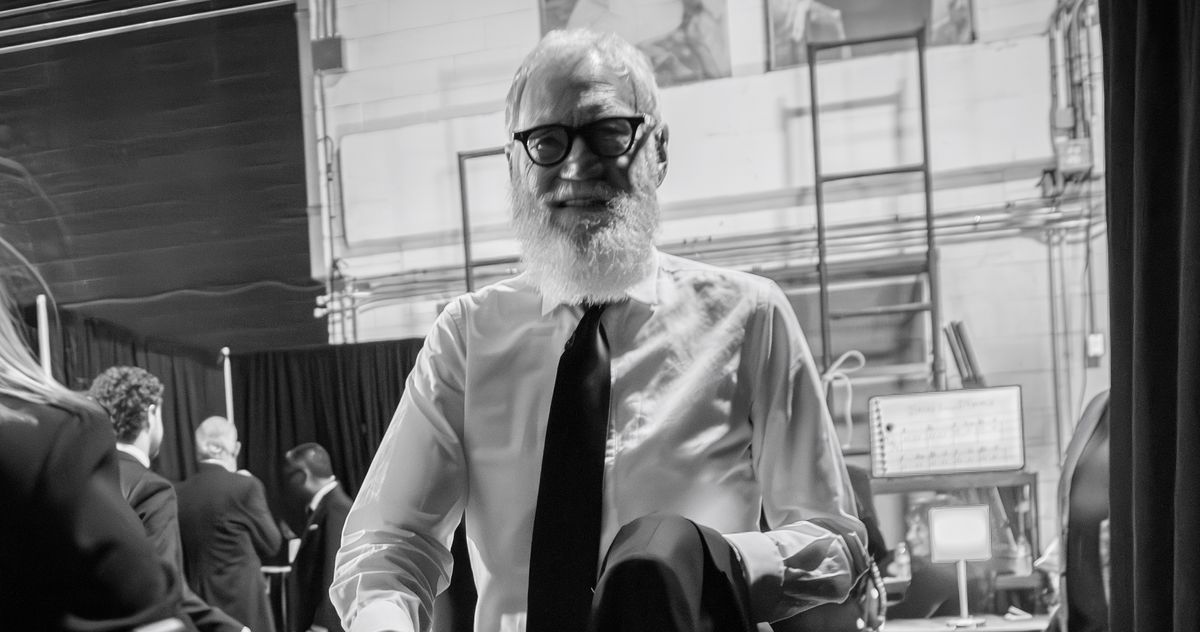
اترك تعليقاً